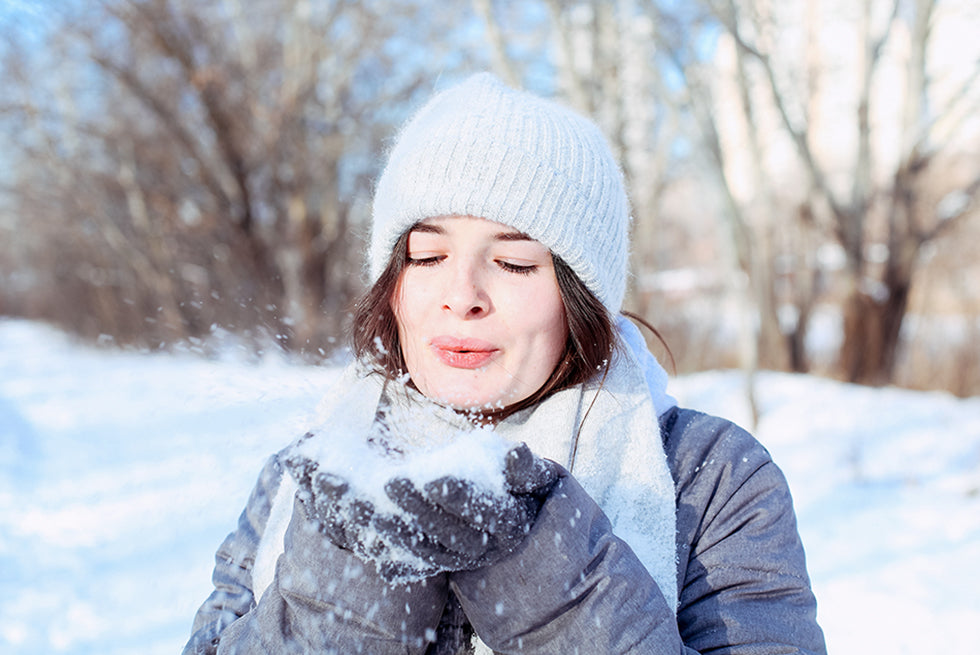With the arrival of cold weather, it is time to review our skin care routine. Just as we prepare our wardrobe for winter, we need to prepare our skin care products to suit the season and meet our skin needs. So is our skin ready for the cold weather of winter? Winter, especially for sensitive and dry skin, creates effects such as dryness, sensitivity and irritation on the skin and requires special care. Don't worry! You can prepare your skin for winter with the right steps and achieve a healthy, moist and bright appearance. Here is everything you need to know about skin care in winter!
Why Does Skin Need More Care During Winter?
During the winter months, environmental conditions have a challenging effect on our skin. During the winter months, the cold air and the decreasing humidity level can disrupt the skin's natural moisture balance. The cold air outside and the dry air created by the warming environment inside cause damage to the skin barrier. In addition, the skin produces less oil during the winter months, which leads to the weakening of the natural protective layer. When these factors come together, the skin:
- It loses moisture and dries more easily.
- It becomes sensitive and more prone to redness and irritation.
- It loses its natural elasticity and takes on a dull appearance.
Your skin needs extra support and protection to adapt to these seasonal changes. Therefore, a special care routine is essential to protect your skin from external factors in winter and to maintain moisture balance.
Negative Effects of Cold Weather on Skin
The negative effects of cold weather and decreasing humidity levels on our skin during the winter months are quite evident. During this period, environmental factors weaken the skin barrier and cause various problems. During the winter months, the skin may encounter the following problems due to the imbalance of cold outside and dry air inside:
Dry Skin: Low humidity levels in cold weather cause the skin to lose its natural moisture. This can cause the skin to feel dry, tight and cracked. Especially in winter, when the skin is caught between the dry air inside and the cold outside, it loses more moisture.
Flaking and Cracks: Due to lack of moisture, the skin surface becomes dry, which can cause flaking or cracking. Cracked skin becomes more vulnerable to micro-irritations.
Redness and Irritation: Cold winds can cause redness, irritation and itching, especially on sensitive skin. Micro-damages caused by the wind weaken the skin barrier and reduce its protective function.
Loss of Elasticity: When skin is not moisturized enough, it loses its elasticity. This causes the skin to look duller, more tired and older. Loss of elasticity can accelerate the appearance of fine lines and wrinkles.
Damage to the Skin Barrier: The barrier, which is the skin's protective shield against external factors, can be damaged in the harsh conditions of winter. When this barrier weakens, the skin becomes more vulnerable and sensitivity increases.
Itching and Eczema: The dryness caused by cold weather can cause itching and flare-ups of skin conditions like eczema. These conditions are more common on the hands, face and lips.
Decreased Blood Flow Cold weather causes blood vessels in the skin to constrict, which can cause the skin to appear dull and slow down the skin's renewal process.
Practical Tips to Prevent Skin Dryness in Winter
In the winter months, the skin can dry out quickly due to the cold weather and low humidity. However, it is possible to prevent skin dryness with the right skin care. Skin dryness in the winter can be prevented with the right care and regular moisturizing. You can protect yourself from the negative effects of the cold weather by caring for your skin with the appropriate products according to its needs. Here are some practical tips you can apply to prevent skin dryness in the winter:
1. Gentle Cleaning
Cleansing your skin is one of the most important steps in your care routine, but avoid harsh cleansers during the winter months . Use gentle cleansers that are free of alcohol and perfume and have moisturizing properties to preserve your skin's natural oil balance. Washing your face with lukewarm water instead of hot water also prevents moisture loss from your skin.
2. Use a Moisturizer
Cold weather causes the skin to lose moisture quickly. Therefore, it is important to use intensive moisturizers in your skin care routine. Moisturizing ingredients such as hyaluronic acid , glycerin and shea butter nourish the skin deeply. Apply the moisturizer to cleansed skin and massage the product into your skin thoroughly.
3. Use Products That Strengthen the Skin Barrier
Strengthening the skin barrier is a critical step in preventing dryness. You can help your skin become more resilient to external factors by using barrier-strengthening products such as ceramide, niacinamide and oil-based creams. These products help retain moisture in the skin by repairing the skin barrier.
4. Exfoliate Your Skin
Exfoliation is important to remove dead skin cells and promote skin renewal. However, avoid harsh exfoliation as skin can be more sensitive in winter. Once or twice a week, exfoliate your skin with a gentle chemical peel or a natural exfoliating product. This will help moisturizers absorb better.
5. Increase Daily Fluid Consumption
Drinking enough water despite the cold weather in winter helps to moisturize the skin from the inside. Make sure to drink at least 8 glasses of water a day. In addition, herbal teas can be beneficial against dry skin. Herbal teas, especially when drunk when hot to make water more appealing, provide moisture to both the body and the skin.
6. Use Moisturizing Face Masks
Face masks that provide intense moisture support can be a great solution for dry skin in the winter months. Apply intense moisture masks to your skin once a week or as needed. These masks nourish the skin and maintain its moisture balance. Masks containing aloe vera and hyaluronic acid will be especially effective.
7. Take Care of Your Lips According to Your Skin Type
In winter, lips can dry out and crack just like skin. Therefore, it is important to use a lip moisturizer. To protect your lips, apply lip balm regularly and exfoliate to remove dead skin.
Moisturizing and Barrier Strengthening Product Recommendations for Winter
It is very important to maintain the skin's moisture balance and strengthen its barrier during the winter months. You can help protect your skin from the cold weather with products that suit your skin needs in the winter. Here are the moisturizing and barrier strengthening products recommended for winter:
Moisturizing Creams Containing Ceramides
Ceramide is an important ingredient that strengthens the skin barrier and helps retain moisture in the skin. The Purest Solutions Ceramide-based Moisturizing Cream deeply moisturizes the skin, strengthens the barrier and combats dryness. With regular use, the skin looks smoother, more elastic and healthier.
2. Hyaluronic Acid Serums
Hyaluronic acid intensively moisturizes the skin and helps repair the skin barrier. The Purest Solutions Hyaluronic Acid Serum provides moisture balance to the skin and prevents dryness. This serum restores the moisture lost by the skin in cold weather, making the skin look healthy and bright.
3. Products Containing Niacinamide (Vitamin B3)
Niacinamide is an ingredient that strengthens the skin barrier, reduces inflammation and balances skin tone. The Purest Solutions Niacinamide Serum accelerates skin repair and protects against the negative effects of winter. It can be used especially on sensitive and dry skin.
What Should Your Winter Care Routine Be Like According to Your Skin Type?
During the winter months, cold weather, wind and low humidity levels can cause dryness, sensitivity and moisture loss on the skin. You can minimize these effects with a care routine suitable for your skin type. Here are winter care routine suggestions according to skin type:
1. Dry Skin
In winter , dry skin needs more moisture. You can choose moisturizing cleansers that do not dry the skin. Use intensive moisturizers containing hyaluronic acid or ceramide. Support the moisture your skin needs by applying a moisture mask 1-2 times a week. Winter sun can also be harmful, do not forget to use SPF 30 and above sunscreens.
2. Oily Skin
Cold weather can also disrupt the moisture balance of oily skin . Cleanse your skin morning and evening with gentle gel or oil-based cleansers. Choose lightweight, water-based moisturizers. Choose oil-free and non-comedogenic products. Apply a BHA-based peeling once or twice a week to prevent pores from clogging. Protect your skin with mattifying, oil-free sunscreens as a final step.
3. Combination Skin
In combination skin, it is important to take care of different needs in different areas of the skin. When balancing the oil in the T-zone, a cleanser that does not dry out the cheeks and nose should be used. Balance the skin by using more intense moisturizers for the cheeks and light moisturizers for the T-zone. You can cleanse your pores by exfoliating the T-zone 1-2 times a week. You can choose a light formula sunscreen.
4. Sensitive Skin
Sensitive skin can experience redness and irritation in cold weather. Choose cleansers that are alcohol-free and fragrance-free, and are specially formulated for sensitive skin. Use moisturizers that contain soothing ingredients. Apply barrier-strengthening creams and serums before going outside to reduce skin problems caused by cold weather. Choose sunscreens with mineral filters.
Should Sunscreens Be Used During Winter Months?
The harmful effects of sunlight on our skin are not limited to the summer months. UV rays can damage our skin all year round. Therefore, sunscreens should be used in the winter months as well.
- UV Rays Are Effective All Year Round: UVA rays can be effective even on cloudy days and can pass through glass. They cause skin aging, blemishes and wrinkles. UVB rays, although less intense in the winter, can be reflected outdoors, especially in snow-covered areas, and can cause skin burns.
- Prevents Skin Aging: Sun exposure is one of the biggest factors in the formation of fine lines, wrinkles and skin blemishes. Using sunscreen in the winter helps slow down skin aging.
- Snow and Reflection Effect: In winter, snow can double the effect of UV rays by reflecting sunlight. It is important to use sunscreen, especially during outdoor activities such as skiing and hiking.
- Prevents Sun Damage: Reduces the risk of skin cancer. UV rays can cause DNA damage in all seasons. Prevents sun spots and hyperpigmentation.
- Necessary in Sensitive Treatment Periods: During the winter months, skin care with active ingredients such as AHA, BHA, and retinol can make the skin more sensitive to the sun. You can prevent skin problems by using sunscreen during this period.





